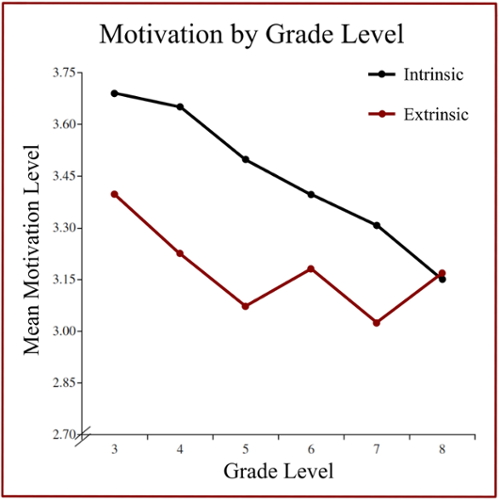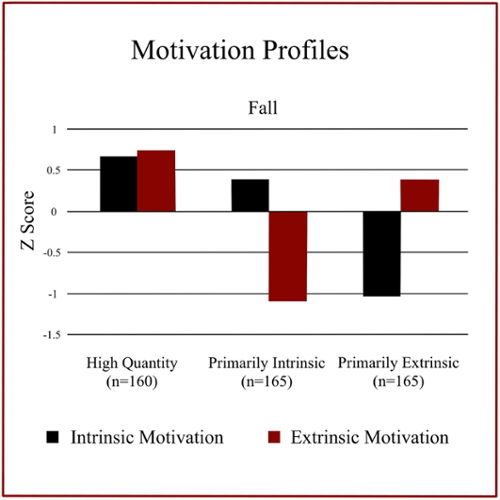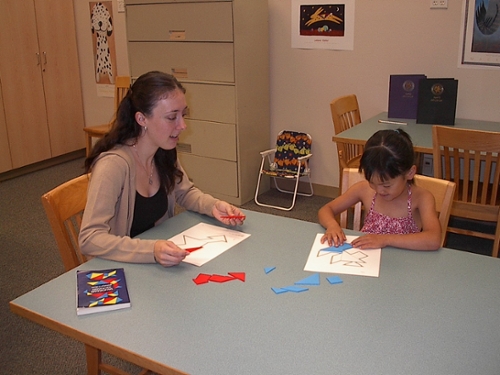Current Research
Trajectories of Motivation
 How does motivation evolve over time and what are the sources of such change? Our research indicates that intrinsic forms of motivation tend to dissipate as children progress through the school years and even over the span of a single academic year. There are, however, important protective factors, such as students' growth mindset beliefs and schools' emphasis on learning and mastery rather than competition. We are also finding predictable motivational change over the collegiate years as students navigate a pivotal time of academic and personal development. Not surprisingly, these patterns of change were altered during the COVID-19 pandemic.
How does motivation evolve over time and what are the sources of such change? Our research indicates that intrinsic forms of motivation tend to dissipate as children progress through the school years and even over the span of a single academic year. There are, however, important protective factors, such as students' growth mindset beliefs and schools' emphasis on learning and mastery rather than competition. We are also finding predictable motivational change over the collegiate years as students navigate a pivotal time of academic and personal development. Not surprisingly, these patterns of change were altered during the COVID-19 pandemic.
Profiles of Intrinsic and Extrinsic Motivations
 Compared to extrinsic motivation, intrinsic motivation is associated with a variety of adaptive behaviors, such as challenge seeking, school involvement, and strong academic performance. But it is unclear whether high levels of extrinsic motivation detract from intrinsic motivation or compound its benefits. We address this question by identifying how different combinations of intrinsic and extrinsic motivations relate to meaningful learning outcomes at the elementary, middle, and high school, and college levels. Our research suggests that a high ratio of intrinsic to extrinsic motivation accords the most benefits, particularly for younger children.
Compared to extrinsic motivation, intrinsic motivation is associated with a variety of adaptive behaviors, such as challenge seeking, school involvement, and strong academic performance. But it is unclear whether high levels of extrinsic motivation detract from intrinsic motivation or compound its benefits. We address this question by identifying how different combinations of intrinsic and extrinsic motivations relate to meaningful learning outcomes at the elementary, middle, and high school, and college levels. Our research suggests that a high ratio of intrinsic to extrinsic motivation accords the most benefits, particularly for younger children.
Praise and Feedback
 Although it is natural for parents and teachers to offer praise for academic achievement, certain types of praise are more beneficial to motivation than others. Our research aims to identify ways of praising students that increase perseverance when they face challenges in the future. In one line of research, we have found that – for both children and college students – praising efforts and strategies (as opposed to personal traits) helps to create resilience when students are later confronted with challenge. In another set of studies, we have found that praising children for task mastery and skill acquisition creates healthier motivational patterns than praising children for outperforming others.
Although it is natural for parents and teachers to offer praise for academic achievement, certain types of praise are more beneficial to motivation than others. Our research aims to identify ways of praising students that increase perseverance when they face challenges in the future. In one line of research, we have found that – for both children and college students – praising efforts and strategies (as opposed to personal traits) helps to create resilience when students are later confronted with challenge. In another set of studies, we have found that praising children for task mastery and skill acquisition creates healthier motivational patterns than praising children for outperforming others.
Recent Press:
“Are you Overpraising Your Child?”